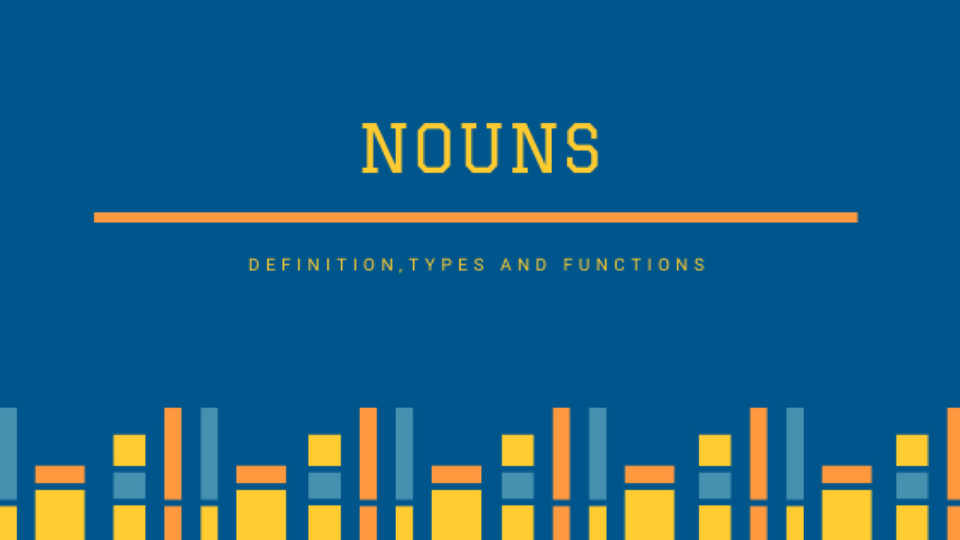Noun (Meaning, Types & Functions)

A noun is a part of speech used to name a person, place, thing, or idea. Within a sentence, nouns can take different forms. They can play the role of a subject, direct object, indirect object, object complement, subject complement, adjective, and appositive.
Examples:
Nouns can name a person: Albert, Michael, Samson
Nouns can name a place: Ontario, Bangladesh, Nigeria
Nouns can name things:
Objects: shoe, pen, basket
Animals: dog, shark, cheetah
Idea: joy, kindness, confusion
Types of Nouns
Nouns make up a large volume of the English vocabulary. Nouns are available in various types and can be classified into two;
- Proper Nouns
- Common Nouns
Proper Nouns
Proper nouns are nouns used to name a specific person, place, or thing. It is always capitalized.
For example;
- Michael slapped her on their way home (Michael is the name of a specific person)
- She travelled to Ghana last week. (Ghana is the name of a specific place)
Common Nouns
Common nouns refer to the generic name of an item in a group. It is sometimes referred to as a generic noun and it is not capitalized except when appearing at the beginning of a sentence.
For example;
- The lady lied to him. (Lady is a common noun. It does not specify the identity of the person)
Common nouns can further be divided into three subtypes;
- Abstract noun
- Concrete noun
- Collective Noun
Abstract noun
Abstract noun refers to things that cannot be perceived by the senses (that is thing that cannot be seen or touched physically)
Examples: Courage, happiness, joy, bravery
Concrete noun
Concrete noun refers to things that can be perceived by the senses.
Examples: door, laptop, television
Collective noun
Collective noun is a word used to denote a group of people or things.
Examples: choir, pack of lions, family
Functions of Nouns
Nouns can play different roles in a sentence. They can be the subject, direct object, indirect object, subject complement, and object complement.
Nouns as Subjects
Every sentence must have a subject that is doing or being the verb. The subject is the person, thing, or place and will always be a noun.
Example: Ann is a dirty girl.
(Ann in this sentence is the subject)
Nouns as Objects
Nouns also play the role of objects in sentences. In sentences, objects of a verb can either be direct or indirect. A direct object is a noun that receives the action performed by a verb, while an indirect object is a noun that is the recipient of the direct object.
Example: Open the door for her.
("Door" is the direct object which is being opened. "Her" is the indirect object who the door is being opened for)
Nouns as Subjects and Objects Complement
Nouns could also take the role of a subject complement in sentences.
Example: Michael is a writer.
(Writer here is a subject complement which tells us what Michael is)
Nouns could also function as object complements in a sentence.
Example:
- Appositives Nouns
Appositive noun comes immediately after another noun to further define it.
Example: My cousin, Funmilayo, is on her way here.
(Funmilayo is an appositive noun in the sentence, it further define the subject of the sentence)
Nouns as Modifiers (Adjective)
Nouns could sometimes function as adjectives.
Example: She is a computer guru.
(Guru is normally a noun, but here acting as an adjective)
Nouns as Adverbs
Nouns could sometimes function as adverbs
Example: The lady leaves today.
(Today is noun here functions as adverb describing the verb leaves)
Nouns as Object of preposition
The object of a preposition is the noun or pronoun governed by a preposition.
Example: I keep my shoes under my bed.
(Here 'bed' is the object of the preposition 'my')
Noun as Possessive Modifier
A possessive modifier is a noun or a pronoun added to a noun to denote possession. A noun that has the form of a possessive modifier can be added to another noun to express some other idea than possession.
Example: He has a lion's strength
(The expression a lion's strength means a strength like that of lions, and not a strength possessed by a lion.)
Possessive Nouns
Possessive nouns show they own something. They can be identified with the presence of an apostrophe and an s.
Example: Micheal's clothes are dirty
Example: Those are Michael's gadgets.
Countable and Uncountable Nouns
Countable nouns are nouns with both singular and plural form. They are nouns that can be counted and can be used with a/an, the, a few, some, any, and many.
Example: That is a cat.
Example: There are a few dogs
Example: Here are some books
Uncountable nouns on the other end are nouns that are impossible to count. They are without a plural form. They are singular and can be used with any, some, a little and much.
Example: You drank much beer yesterday.
Example: There is a little food left.
Compound Noun
When two or three nouns appear together or with other parts of speech they create what is called idiomatic compound nouns. Idiomatic means that those nouns behave as a unit and, to a lesser or greater degree, amount to more than the sum of their parts.
Example: three-year-old, six-pack, and daughter-in-law, mailbox, etc.
Common issues associated with nouns;
- Use only capital letters with a proper noun
- Treat collective nouns as singular but treat as plural if the context implies
